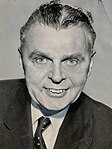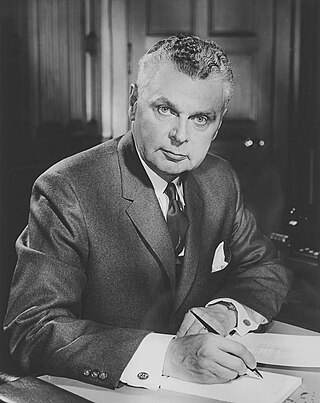
John George Diefenbaker was the 13th prime minister of Canada, serving from 1957 to 1963. He was the only Progressive Conservative party leader between 1930 and 1979 to lead the party to an election victory, doing so three times, although only once with a majority of the seats in the House of Commons.

The Progressive Conservative Party of Canada was a centre to centre-right federal political party in Canada that existed from 1942 to 2003.

The leader of the Official Opposition, formally known as the leader of His Majesty's Loyal Opposition, is the politician who leads the Official Opposition in Canada, typically the leader of the party possessing the most seats in the House of Commons that is not the governing party or part of the governing coalition.

The Conservative Party of Canada has gone by a variety of names over the years since Canadian Confederation. Initially known as the "Liberal-Conservative Party", it dropped "Liberal" from its name in 1873, although many of its candidates continued to use this name.

The Social Credit Party of Canada, colloquially known as the Socreds, was a populist political party in Canada that promoted social credit theories of monetary reform. It was the federal wing of the Canadian social credit movement.
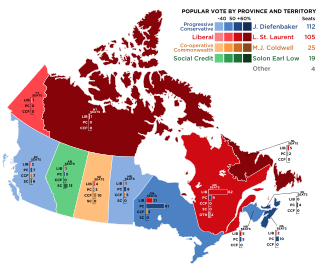
The 1957 Canadian federal election was held June 10, 1957, to select the 265 members of the House of Commons of Canada of the 23rd Parliament of Canada. In one of the greatest upsets in Canadian political history, the Progressive Conservative Party, led by John Diefenbaker, brought an end to 22 years of Liberal rule, as the Tories were able to form a minority government despite losing the popular vote to the Liberals.

John Bracken was a Canadian agronomist and politician who was the 11th and longest-serving premier of Manitoba (1922–1943) and later the leader of the Progressive Conservative Party of Canada (1942–1948).
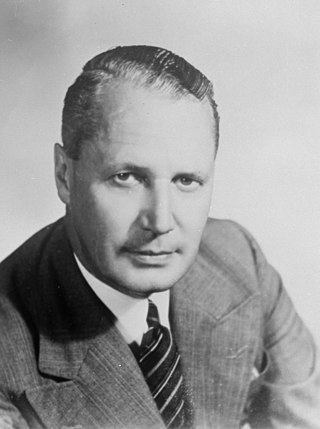
George Alexander Drew was a Canadian politician. He served as the 14th premier of Ontario from 1943 to 1948 and founded a Progressive Conservative dynasty that would last 42 years. He later served as leader of the federal Progressive Conservative Party and Leader of the Official Opposition from 1948 to 1956.
The first Progressive Conservative Party of Canada leadership election was held in 1927, when the party was called the Conservative Party. Prior to then the party's leader was chosen by the caucus or in several cases by the Governor General of Canada designating a Conservative MP or Senator to form a government after the retirement or death of an incumbent Conservative Prime Minister.
William Heward Grafftey was a Canadian politician and businessman.

The 1983 Progressive Conservative leadership election was held on June 11, 1983, in Ottawa, Ontario to elect a leader of the Progressive Conservative Party of Canada. At the convention, Montreal businessman and lawyer Brian Mulroney was elected leader on the fourth ballot, defeating former prime minister and party leader Joe Clark.

The 1976 Progressive Conservative leadership election was held at the Ottawa Civic Centre in Ottawa on February 22, 1976, to elect a leader of the Progressive Conservative Party of Canada to replace Robert Stanfield, who had resigned after losing the 1968, 1972, and 1974 elections. It unexpectedly elected a 36-year-old, little-known PC Member of Parliament from Alberta as the party's new leader. Joe Clark defeated Claude Wagner on the fourth ballot of the convention by a margin of 65 votes.

The 1967 Progressive Conservative leadership election was held to choose a leader for the Progressive Conservative Party of Canada. The convention was held at Maple Leaf Gardens in Toronto, Ontario, Canada between September 4 and 9, 1967. Robert Stanfield was elected the new leader.
Wilfrid Garfield Case also known as W. Garfield Case,, was a Canadian politician who served as a Progressive Conservative Member of Parliament and Mayor of Owen Sound, Ontario. He is best known for his upset victory over Defence Minister General Andrew McNaughton in the Grey North federal by-election held on February 5, 1945.

The 1989 New Democratic Party leadership election was held in Winnipeg, Manitoba, from November 30 to December 3 to elect a leader of the New Democratic Party of Canada. Ed Broadbent retired as federal leader, and Audrey McLaughlin was elected as his replacement. McLaughlin's victory was the first time a woman won the leadership of a major federal Canadian political party. This convention was followed by six years of decline for the party, culminating in the worst electoral performance of a 20th-century federal democratic socialist party, when the party received only seven percent of the popular vote in the 1993 federal election.

The 1998 Progressive Conservative leadership election was held on October 24 and November 14, 1998 to choose a successor to Jean Charest. This was the first time the Progressive Conservatives used a one member, one vote system to choose a leader rather than a delegated leadership convention, which has been the norm since 1927. The 1998 election used a point system that allocated 100 points to each riding, regardless of the number of votes cast in the riding. The candidate who won a majority of points would win the leadership. All party members were eligible to cast a vote. If no candidate received a majority of points on the first ballot, the lowest ranking candidate would be automatically eliminated and a second ballot was to be held using a preferential ballot if more than two candidates remained. The 100-point-per-riding system was again used by the Conservative Party of Canada in their leadership elections.

The 1956 Progressive Conservative leadership election was held to choose a leader for the Progressive Conservative Party of Canada. The convention was held at the Ottawa Coliseum in Ottawa, Ontario, Canada. The convention began on December 13, 1956 with voting occurring on December 14 when John Diefenbaker was elected the new leader.

The 1942 Progressive Conservative Party leadership election was held to choose a leader to replace Arthur Meighen for the newly named Progressive Conservative Party of Canada.
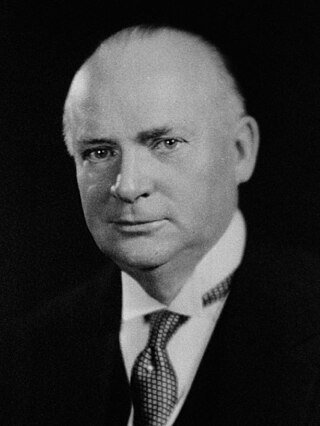
A Conservative leadership convention was held on October 12, 1927 at the Winnipeg Amphitheatre in Winnipeg, Manitoba. The convention was held to choose a new leader of the Conservative Party to choose a successor to former Prime Minister of Canada Arthur Meighen who had led the party since 1920. This was the first time the Conservatives used a leadership convention to choose a leader. Previous leaders had been chosen by the party's caucus, the previous leader, or by the Governor General of Canada designating an individual to form a government after his predecessor's death or resignation.

This article is the Electoral history of John Diefenbaker, the thirteenth Prime Minister of Canada.

